In 2019, when the police were the sole enforcer, the NYPD issued 1,812 tickets versus 2,499 in the first nine months of this year, with almost half (48.6 percent) doled out in the last quarter. In just nine months, the NYPD and the Department of Consumer and Worker Protection (DCWP) have issued 3,884 tickets to vendors, more than double the number of tickets made in 2019.
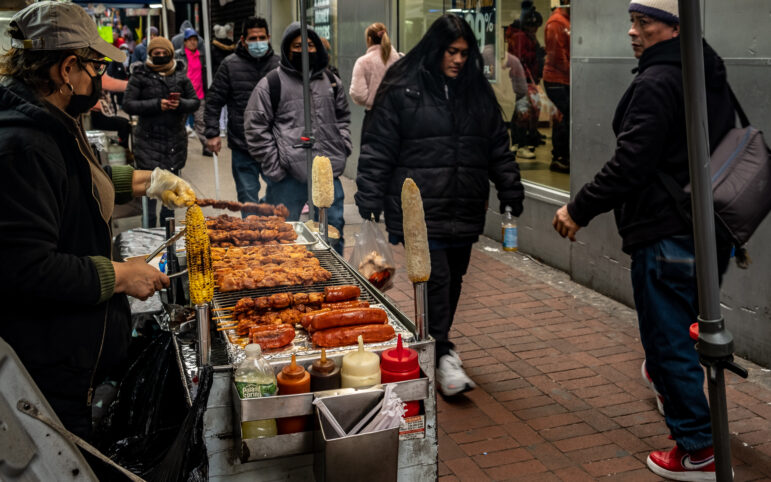
Adi Talwar
A street vendor on Roosevelt Avenue in Jackson Heights, Queens, the zip code that saw the most enforcement this year by the city’s Department of Consumer and Worker Protection (DCWP).This year, the NYPD has been the leading enforcement agency against street vendors, breaking from an earlier pledge to take them out of the process as part of reforms announced by former Mayor Bill de Blasio.
Police issued more tickets to vendors in 2022 so far than the Department of Consumer and Worker Protection (DCWP), a City Limits’ data analysis found, despite the fact that DCWP was put in charge of vendor enforcement last year after passage of the City Council’s street vendor reform law. That change was codified in a guideline operations order issued to police officers at the start of 2021, which advised NYPD to avoid taking action around vendor enforcement “absent exigent circumstances.”
The number of tickets issued to street vendors in the first three-quarters of 2022 have also surged, far exceeding what was seen in the year before the pandemic (City Limits is comparing this year’s numbers to 2019, since that was the last full prior year the city was actively ticketing vendors; the pandemic halted most enforcement in 2020, while the DCWP spent the first half of 2021, when it took over as enforcement lead, focused on vendor outreach and education in lieu of most fines).
In 2019, when the police were the sole enforcers, the NYPD issued just 1,812 tickets, versus 2,499 issued in the first nine months of this year, with almost half (48.6 percent) doled out in the last quarter, according to an analysis of the police department’s quarterly reports.
Meanwhile, DCWP issued 1,385 tickets in the first three quarters of 2022, from June to September. In just nine months, the two city agencies have issued 3,884 tickets, more than double the number of tickets issued to vendors in 2019.
“Although the primary responsibility is led by Department of Consumer and Worker Protection the NYPD maintains its authority to enforce all violations and officers use a high level of discretion,” a police spokesperson said, adding that they worked with the mayor’s office in the transition, which included disbanding the NYPD Peddler’s Task Force.
For years, vendors and their advocates have been pushing to remove police from enforcement, arguing the practice is overly punitive against an industry largely made up of immigrant New Yorkers and people of color.
“We want to see the NYPD completely out of this,” said Council Member Shahana Hanif, chair of the immigration committee.
NYPD’s shift away from vendor enforcement was officially made in January 2021, and for the first half of that year, DCWP conducted outreach and education campaigns, only beginning enforcement functions that June. Meanwhile, a law to gradually increase the number of permits that food vendors need to operate legally, which the city had capped for decades, has stalled. (The city’s Health Department, which is in charge of that expansion, told Mother Jones in October that it was “making progress” on those plans).
The limited number of currently available permits, advocates say, has made it nearly impossible for most vendors to operate legally, forcing many to pay thousands of dollars for permits on the black market to continue working.
“The city has created an artificial problem of scarcity by limiting the number of licenses,” said Council Member Shekar Krishnan, whose Jackson Heights district saw the most street vendors inspected and ticketed by DCWP both this year and last. “The legalization of [vendors’] work and the recognition of their importance to New York City are long overdue. ”
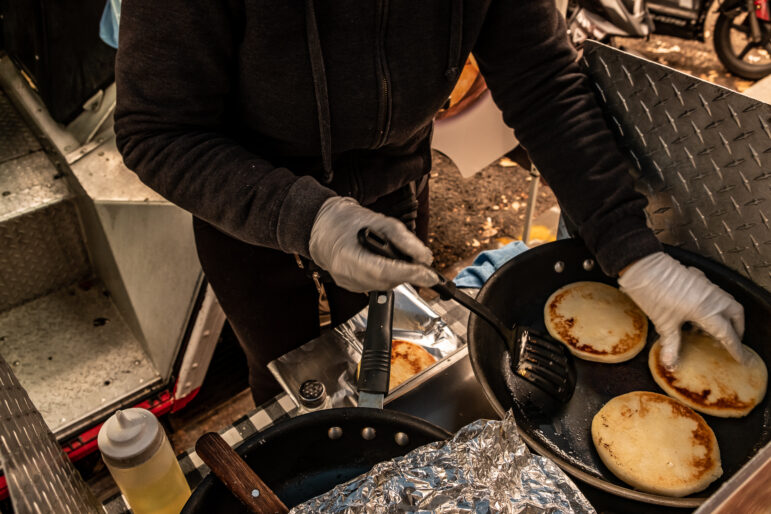
Adi Talwar
A food vendor cooks up pupusas in Queens.Where rules are broken
The NYPD does not break down the number of tickets it issued to vendors by zip code, but the DCWP does. Since the agency started giving out tickets, Jackson Heights (zip code 11372) has been the most ticketed area for vendors in both 2021 and 2022, though it does not rank in the top five zip codes with the most complaints.
| Top Zip Codes for Complaints | # of Complaints | Top Zip Codes for Inspections | # of Inspections | Top Zip Codes for Tickets | # of Tickets |
| 10001 | 1,185 | 11372 | 915 | 11372 | 147 |
| 10004 | 611 | 11220 | 656 | 10036 | 84 |
| 10007 | 481 | 11354 | 590 | 10001 | 67 |
| 10005 | 401 | 11368 | 571 | 11368 | 55 |
| 10019 | 304 | 11355 | 395 | 10003 | 54 |
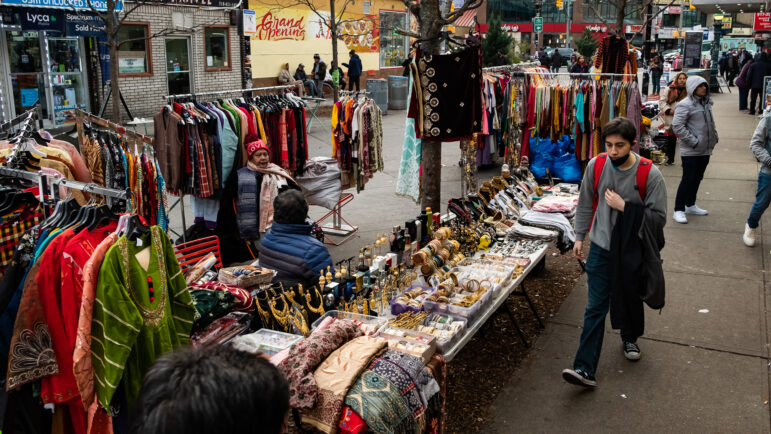
Adi Talwar
Street vendors near Roosevelt Avenue in Jackson Heights, Queens.In the past, DCWP has argued that enforcement is often a response to complaints from the general public, elected officials, community boards, and Business Improvement Districts, which have butted heads with vendors over things like litter, blocked sidewalks and their potential impact on brick-and-mortar small businesses.
The city received more complaints about street vendors this year compared to last: there were 4,736 vendor complaints in 2021 versus 7,081 in the first three quarters of 2022.
However, only one of the zip codes with the most complaints this year is in the top five for tickets, highlighting the mismatch seen in other data analyses of where complaints originate and where tickets are written. When asked about it, DCWP’s spokesman Michael Lanza explained that tickets are the result of violations of the law.
“The number of those inspections that result in summonses depends on whether the vendor complies with the rules and ceases any illegal conduct identified during the inspection as DCWP employs an education-first approach,” he added. “DCWP issues more summonses in the areas where vendors refuse to follow inspectors’ instructions.”
Vendors like Cleotilde Juarez, 31, said she hasn’t seen DCWP’s education-first approach in Jackson Heights, where she works selling chalupas poblanas—an iconic street food in Puebla, Mexico.
“That’s not true,” Juarez said. “They [DCWP] come and say, ‘Give me your ID and take your ticket.’ They are not the ones who educate. No. It’s the organizations.”
| Borough | Complaints | Inspections | Tickets |
| BRONX | 432 | 1,202 | 107 |
| BROOKLYN | 1,018 | 2,502 | 232 |
| MANHATTAN | 4,625 | 3,360 | 611 |
| QUEENS | 868 | 3,514 | 433 |
| STATEN ISLAND | 26 | 13 | 2 |
Manhattan saw the largest number of complaints and tickets compared to the other boroughs overall, followed by Queens. Two Queens zip codes, 11372 and 11368, which encompass Jackson Height and Corona, accounted for almost half (46 percent) of all tickets (433) in the borough this year. Both neighborhoods are known for having ample and globally diverse food offerings, which supporters argue is a boon for local businesses.
“New Yorkers and tourists around the world alike know Jackson Heights and Corona as ‘foodie destinations’–giving rise to an entire economy of food tours, cultural events, bringing foot traffic and commerce to the area,” Street Vendor Project’s (SVP) Deputy Director Carina Kaufman-Gutierrez said.
Congresswoman Alexandria Ocasio-Cortez, who represents both areas, said that “street vendors in immigrant communities like in Jackson Heights have faced historic harassment by the NYPD for trying to make an honest living through feeding their communities.”
“It is highly alarming that DCWP continues to carry out police practices—complicating the lives of vendors by diminishing their daily income and drowning them in hefty fines all the while vendors remain subject to over-policing by the NYPD,” the lawmaker said in a statement.
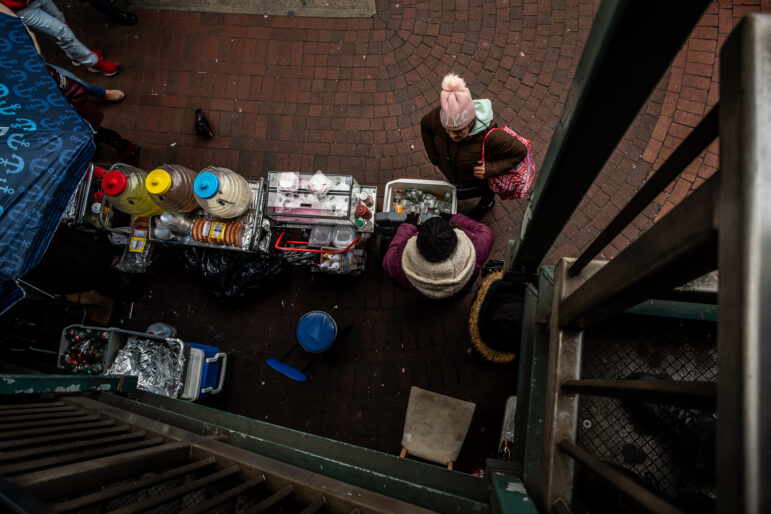
Adi Talwar
A vendor in Jackson Heights, Queens.
Immigrants inspected
Neighborhoods with a large immigrant population also continue to be among the most inspected by DCWP since 2021, as previously reported by City Limits, but this year Queens is at the center of them. This is a change from last year, when Manhattan was the most inspected borough.
The five zip codes with the most inspections by the agency in 2022 are neighborhoods with a large immigrant population, and none of them are at the top of complaints. The most inspected area, Jackson Heights, had more inspections (915) than complaints in the borough overall (868).
DCWP reiterated that inspections are not exclusively triggered by complaints, although they did not elaborate in detail on what else triggers an inspection. “DCWP conducts inspections in areas where vendors frequently operate and in response to complaints we receive,” Lanza said.
Queens Borough President Donovan Richards, however, called the inspection pattern a “xenophobic policy.”
“Why is there this over enforcement in these communities?” he said. “Criminalization is not the way to address poverty.”
Both last year and this year, Manhattan has been the epicenter of complaints, generating more than 65 percent in 2022, with five times as many complaints as Queens and more than four times as many as Brooklyn, per DCWP data.
But Queens has been the most inspected borough so far (3,514) triggered by less than one quarter (868) of complaints in the borough this year. One in three DCWP inspections were in Queens, according to data.
“Despite the majority of complaints centered in Manhattan, the data reveals that DCWP’s priorities are not the wealthy zip codes but the vulnerable immigrant working-class communities,” Ocasio-Cortez said.
“If our Queens communities do not make up the majority of street vending complaints, why is DCWP using its resources to issue the most tickets and inspections here than anywhere else in the city?” Ocasio-Cortez said in a statement. “DCWP should clarify the reasoning behind its disproportionate enforcement directives.”
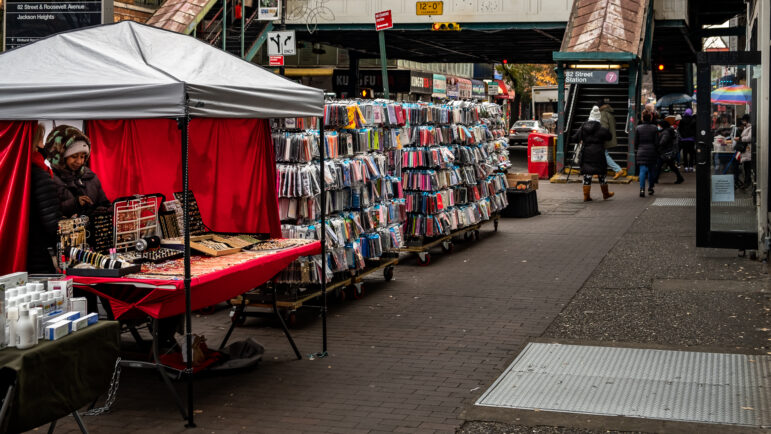
Adi Talwar
Street vendors near the 82nd Street subway station in Jackson Heights, Queens.Frustrations of residents
However, Council Member Marjorie Velázquez, who chairs the Committee on Consumer and Worker Protection, said that DCWP takes consumer complaints seriously and works to ensure vendors—long-time contributors to the city’s economy—are held accountable, especially those violating the law.
“As the Chair of the Committee on Consumer and Worker Protection, I must act in the best interest of our community, and that means supporting lawful vendors while also working with DCWP to ensure all parties are held accountable,” Velázquez said.
Other lawmakers point to quality-of-life issues associated with street vending that they say warrants ample enforcement. Two zip codes that are part of Flushing (11354 and 11355) also had more inspections than all the complaints in Queens.
“One of the most common complaints my office receives is about the proliferation of unlicensed street vendors in Downtown Flushing,” said Council Member Sandra Ung, emphasizing that her statements only apply to the district she represents, and are not meant to reflect enforcement in other neighborhoods.
“It has become a public safety issue, from mobility-impaired individuals who can no longer navigate the sidewalks to the health risks of the unregulated selling of live seafood on city streets. In addition, many of the larger vendors are selling counterfeit goods and blocking crosswalks, fire hydrants, and bus and subway stops,” Ung added.
According to Ung, DCWP has encouraged compliance in Flushing, resorting to violations only when those efforts are exhausted or for repeat violators. “The enforcement DCWP undertakes in downtown Flushing is in response to the frustrations of residents in the only Asian majority district in the City Council,” she said.
For the Flushing Councilwoman, the low number of complaints sent to DCWP from her district does not mean vending isn’t an issue there, but can be attributed to a lack of confidence in government and language barriers.“Officially logged complaints are historically low in immigrant communities with a high number of limited English proficiency residents who are uncomfortable using official government channels,” Ung said, adding that she sponsored two laws to improve language access for limited English proficient 311 callers.
Street vending has been the subject of heated debates in Flushing for years. In 2018, then-Councilman Peter Koo sponsored legislation that created no-vending zones in the neighborhood’s downtown. But advocates argue tickets and zero-tolerance areas are not solutions.
“At a time when economic recovery for immigrants and low-income people of color is seemingly of utmost importance to the city, it is unacceptable that street vendors continue to be criminalized for doing public service and operating honest businesses,” SVP’s Managing Director Mohamed Attia said. “In reality, vendors are part of what keeps our city safe. They are the eyes on the street, they are community builders, and neighbors.”
He echoed those calling for the city to move forward with implementing the City Council’s vending reform bill, Local Law 18, which was supposed to begin increasing the number of vending permits this summer. But none have been issued more than five months after they were promised.
“This data shows how imbalanced the city’s approach to the street vending industry is,” Attia said. “Investment is purely happening in enforcement, rather than in implementing the local law 18.”
State Senator Jessica Ramos sponsored a bill earlier this year that would have eliminated the permit cap altogether, and that would vacate previous convictions for street vending offenses that especially affect immigrants. But the bill did not pass in the most recent legislative session, pushing the issue potentially to be debated again in Albany in 2023.
“[T]he City should move to address the heart of the issue and commit to substantially lift the cap on permits in order to meet the true demand from vendors in desperate need,” Ocasio-Cortez said.









One thought on “City’s Street Vendors Saw Twice as Many Tickets This Year Compared to Pre-Pandemic, With NYPD Leading Enforcement”
Wow.
City Council has tons of concern for street vendors and seeking more protection for street vendors – but zero concern for people (many immigrants!) who actually run small stores!
In NYC, small/local/independent stores face price sabotage from street vendors; competition from chains and ecommerce; high rents from landlords; displacement by ongoing gentrification; dealing with City rules, fines etc; utility costs; crime/shoplifting; loss of visibility and access due to restaurant shacks/ /closed streets “open streets” etc.
Thinking of one area where only one “regular” food market now remains. There are multiple fruit/vegetable stands surrounding the food market – and impacting the food market sales. Not OK.
BTW the City has done everything to help restaurants deal with the 2020-2021 Covid crisis – giving free space to restaurants and not enforcing rules – but nothing for stores. A longtime local shop was threatened by a new restaurant when the shop would not agree to restaurant shack that would block the store; a small take-out food place which also does some catering no longer has space for its van due to an adjacent restaurant shack and bike lane….lots of similar stories… .
Would appreciate if City Limits interview Council reps about why they don’t care about actual small store owners – including immigrants. Whyt areen’t shop owners prioritized?
Many small shop owners have given their lives to their businesses, have helped support the community and are essential to NYC neighborhoods.